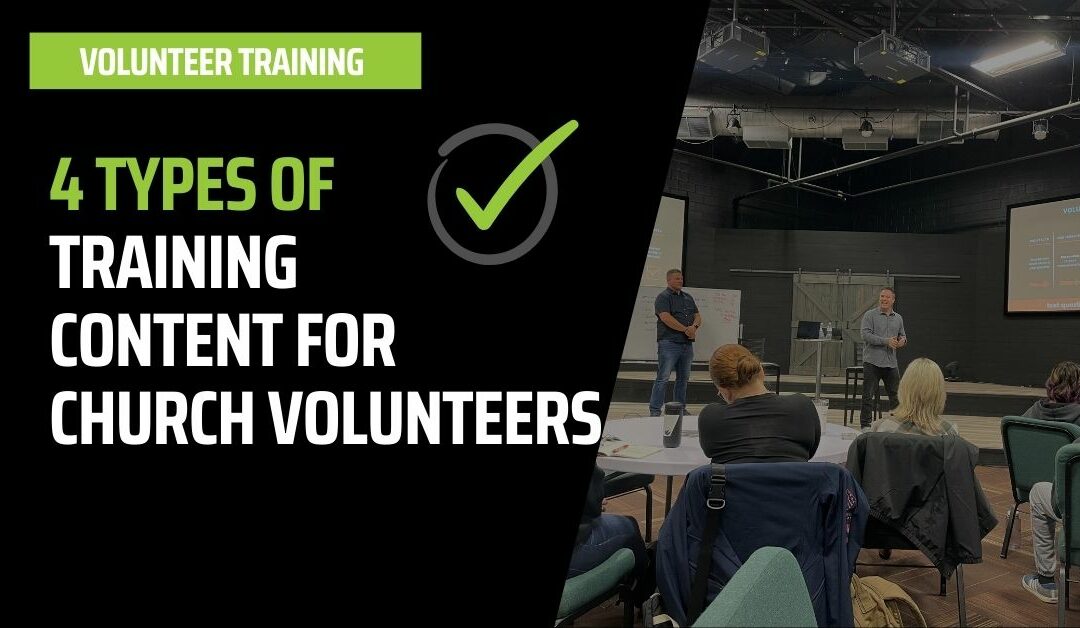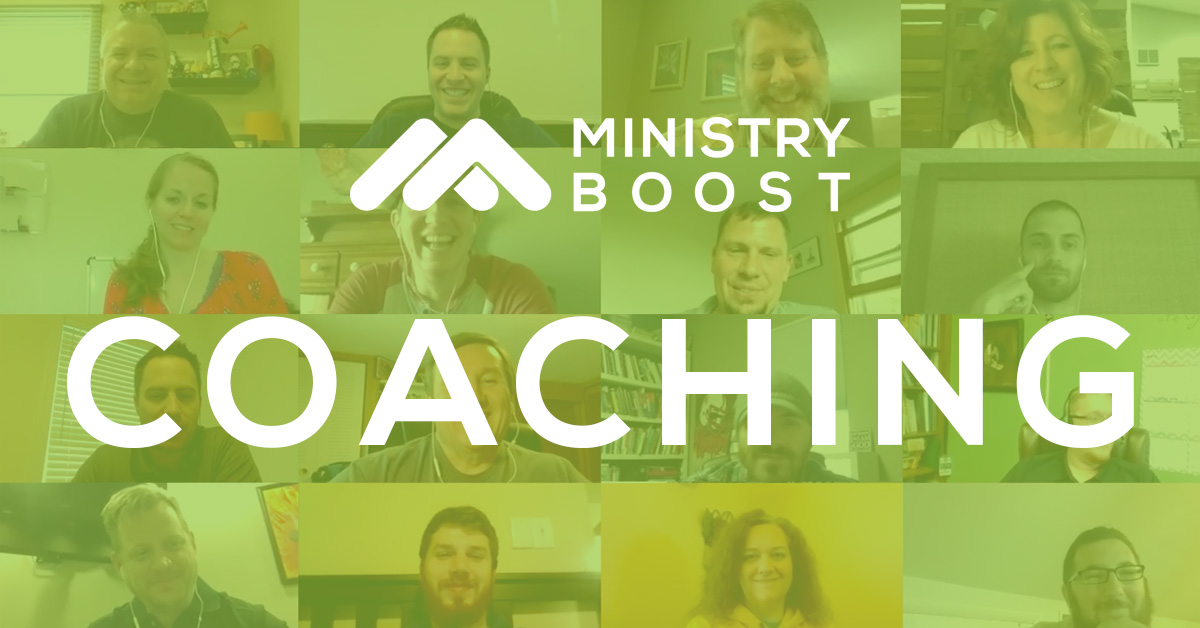As church leaders, it's crucial that we continuously train our volunteers throughout the year. We often face the challenge of deciding what to focus on during these training sessions. The range of possible topics is vast—covering everything from the church's vision and mission to specific skills and roles. With so many options available, it's easy to feel overwhelmed.
In this article, we'll explore four different types of training content that we can use or create when working with our volunteers. This approach aims to make the process less daunting, especially for those of us who may not find creating training content to be a natural or enjoyable task. By leveraging these types of content, we can ensure that our volunteers are well-prepared, motivated, and aligned with our church's mission.
Key Takeaways
- Training should cover vision, strategy, and specific skills.
- Existing packages and custom creations are both viable options.
- Volunteers need to understand the ‘why' behind their tasks.
The Significance of Training Content
Every church leader must continually train volunteers throughout the year. There are countless topics we can focus on, from church vision and strategy to specific role-related skills. Training content can cover relational skills, leadership abilities, and pastoral skills, among other things. Given the wide variety of potential content, choosing the right focus can be challenging.
Here are four types of training content to consider:
Vision
Training focused on vision helps answer the fundamental question of “why.” Volunteers often have questions in their minds about why certain actions are taken and why things are done in a particular manner. Even if these questions aren't voiced openly, they influence their engagement and commitment. Understanding the underlying reasons can align their actions with the church's mission and diminish resistance.
Vision-based training also motivates volunteers by engaging their hearts, not just their hands. Purpose, a key motivator, is enhanced when volunteers comprehend the broader mission of the church—to reach people, make disciples, and introduce others to Jesus. By regularly reinforcing this vision, volunteers understand the significance of their roles, even in seemingly minor tasks, keeping them motivated and driven.
Strategy
Strategy training is about the “how” of your ministry. It encompasses the overarching methods the church uses to achieve its mission and the specific tactics volunteers need to execute in their roles.
For instance, discussing the church's disciple-making process provides a big-picture view of the ministry's operations. This could include a five-part or three-part strategy unique to your church’s approach. On a detailed level, it addresses the practicalities of volunteer tasks, ensuring everyone understands the processes and expectations.
A clear strategy helps volunteers work cohesively, knowing not just what to do, but why and how to do it effectively.
Sources for Volunteer Training
Training our volunteers effectively involves selecting diverse content to cover a range of essential topics. This can sometimes be overwhelming due to the sheer amount of material available. Here are four different types of training resources we can use:
- Church Vision: Understanding the church's vision answers the “why” behind what we do. It's crucial for volunteers to grasp why certain methods and approaches are taken, even if they initially disagree. Knowing the deeper purpose behind their tasks fosters motivation and commitment.
- Relational Skills: Since many volunteer roles involve interaction with others, training on relational skills is invaluable. These skills help volunteers communicate better, resolve conflicts, and build meaningful connections within the church community.
- Leadership Skills: Some volunteers may take on leadership roles, guiding others and making decisions. Training them on leadership principles equips them to inspire, direct, and support their teams effectively.
- Pastoral Skills: For those in roles that require caregiving and spiritual guidance, pastoral skills are vital. Training in this area helps volunteers provide emotional and spiritual support to church members, ensuring a nurturing environment.
We can choose from pre-made training packages, create our customized materials, or adapt existing resources. Some leaders enjoy brainstorming and developing unique training content, while others prefer to use ready-made materials. Either way, having a solid starting point helps streamline the process.
Using a blend of these types of content ensures comprehensive training that addresses various needs across different volunteer roles. This approach not only makes the training more effective but also reinforces the significance and impact of each volunteer's contribution.
The Creative Process
Brainstorming Needs
When we start thinking about what to train our volunteers on, the possibilities can feel endless. We could talk about the church's vision and mission, address specific skills needed for their roles, or focus on leadership and relational skills. To simplify this process, it's helpful to ask ourselves what our volunteers need most right now. This is where a good brainstorming session comes into play. Gather your thoughts, maybe even jot them down on a whiteboard. Consider asking your volunteers for feedback or reflecting on recent challenges and successes. All these inputs can help you decide the direction of your training content.
Outlining the Training
Once we've pinpointed a focus, the next step is to outline the training plan. Start by breaking it down into key sections that cover the essential points. For instance, if you're focusing on the church's vision, structure the training to explain the “why” behind what we do. Use simple lists, bullet points, or even tables to organize the information and make it accessible. An outline not only helps in delivering the content systematically but also ensures that nothing important gets left out. This step is crucial in turning brainstormed ideas into actionable and coherent training sessions.
Training for Church Leaders vs. Volunteers
We need to train our volunteers throughout the year. It's essential to choose the right content for these training sessions, reflecting the diverse roles and responsibilities within our church. Topics can range from our church vision, strategy, and mission to specific skills necessary for their roles. Let's focus on four specific types of training content, which can provide a structured approach for everyone involved.
1. Vision
Training on vision helps answer the question “why” for our volunteers. This involves explaining our mission, why we do things the way we do, and the bigger picture of the church’s goals. This understanding motivates them, making them see the significance of their roles. For instance:
- Purpose: We're not just facilitating services; we're helping introduce people to Jesus.
- Role Importance: Every role, from greeting at the door to leading a group, contributes to the mission.
2. Strategy
Strategy training provides clarity on “how” we accomplish our mission. This involves both big-picture strategies and specific details:
- Big Picture: How we make disciples and our multi-step approaches, like celebrating, connecting, and contributing.
- Detailed Processes: Step-by-step guides for specific tasks volunteers might undertake. For example:
| Strategy Component | Details |
|---|---|
| Celebrate | Engage regularly in services |
| Connect | Participate in small groups |
| Contribute | Serve on volunteer teams and support financially |
Adopting these structured strategies ensures everyone is aligned and working towards the same goals effectively.
Four Types of Training Content
Vision
Training on vision helps our volunteers understand the reason behind our actions. It's about answering the question: why? Why do we do things a certain way? Why is this needed now? These questions might not always be voiced out loud, but they linger in the minds of our volunteers. Understanding the “why” can transform their approach and motivation.
By explaining the vision, we make it clear why certain actions are important. This not only fosters agreement but also maintains a sense of purpose. For instance, a volunteer might not realize the significance of greeting people at the door, but if they understand the bigger picture, it changes their perspective.
Strategy
When we talk about strategy, we focus on the “how.” Strategy training prepares our volunteers to execute tasks efficiently in line with our ministry's overall goals. This can include both the broad strategies of how our church aims to make disciples and the finer details of day-to-day operations.
Whether it’s explaining the church's multi-step disciple-making process or the specific ways we organize our events, strategic training ensures everyone knows how to contribute effectively. For instance, our church might follow a three-part strategy: celebrate, connect, and contribute. This clear structure helps our volunteers understand their roles within the larger strategy.
Autonomy, Mastery, and Purpose
The study findings by Daniel Pink emphasize three key motivators: autonomy, mastery, and purpose. Applying these concepts to our training can greatly enhance volunteer engagement. Autonomy allows volunteers to feel they have control over their tasks. Mastery ensures they are continuously learning and improving their skills. Purpose ties their work to a bigger mission, driving deeper commitment.
Training focused on these areas can help our volunteers feel more connected, competent, and motivated. By nurturing these elements, we create an environment where our volunteers not only understand their tasks but are also passionate about their roles in our ministry.
The Importance of ‘Why' in Volunteer Engagement
When we think about training our volunteers, one of the most crucial elements we can focus on is the “why” behind what we do. Addressing the why can clarify the bigger picture, helping volunteers understand the reasons behind our church’s vision, mission, and the specific ways we carry out various tasks.
Key Questions Volunteers Might Have:
- Why do we do this?
- Why this way?
- Why is this needed?
- Why now?
Though volunteers might not verbalize these questions, they often think about them. They may internally debate the merits of certain practices, wondering if there might be better alternatives. By clearly communicating the “why,” we can bridge the gap between understanding and action.
Benefits of Answering the Why:
- Motivates volunteers to perform their duties effectively.
- Helps them see the significance of their roles.
- Encourages alignment with the church’s goals and methods.
The Power of Purpose in Motivation:
Daniel Pink’s book The Surprising Truth About What Motivates Us provides great insight into this topic. According to a study discussed in the book, the top three motivators for people in their jobs are:
- Autonomy
- Mastery
- Purpose
When we train volunteers on our vision, we tap into that sense of purpose. Understanding the greater mission helps them see the importance of their contributions, no matter how small they might seem. For example, a volunteer who greets people at the door plays a critical role in making everyone feel welcome and valued, which is essential for achieving our mission.
By continually casting vision and emphasizing our purpose, we keep our volunteers engaged and motivated, ensuring that they understand their impact and stay committed to our shared goals.
Daniel Pink's Motivation Theory
Autonomy
Autonomy means giving people the freedom to direct their own lives. It's about letting individuals take charge of their own tasks and responsibilities without constant oversight. This can create a more engaging and fulfilling experience for our volunteers, as they feel trusted and empowered to make decisions. We focus on fostering an environment where each person feels like a leader in their own right, contributing their unique skills and perspectives.
Mastery
Mastery involves the desire to improve and excel in one's role. We encourage our volunteers to continuously develop their skills and abilities, which not only enhances their personal growth but also benefits the ministry as a whole. By providing resources and opportunities for learning, whether through training sessions or mentorship programs, we help our volunteers become experts in their roles. Mastery is about the joy of improving and tackling new challenges.
Purpose
Purpose is what drives individuals to understand the importance of their contributions. Volunteers need to see the bigger picture and how their efforts fit into the mission of the church. When they grasp that their work has a meaningful impact—such as making disciples or reaching out to the community—it fuels their motivation. We make it a priority to communicate and train on our purpose regularly, ensuring everyone knows the vital role they play in our collective mission. By reinforcing this sense of purpose, we keep our volunteers inspired and committed to the cause.
Communicating the Church's Mission
Communicating the Mission is crucial for aligning our volunteers with our church's overarching goals. By clarifying the “why” behind our actions, we help our volunteers understand the significance of their roles. They may not explicitly ask why certain tasks are done a particular way, but these questions often linger in their minds. Addressing this early on can promote unity and purpose within the team.
The Importance of Vision
When we talk about vision, we focus on answering the “why.” Our volunteers need to grasp why we undertake specific tasks and procedures. This understanding fosters motivation and clarity. For instance, understanding the reason behind greeting visitors warmly at the door can help volunteers see their actions as an integral part of our mission to welcome and reach out to the community.
Insights on Motivation
Research, such as Daniel Pink’s study in “The Surprising Truth About What Motivates Us,” highlights three significant motivators:
- Autonomy: The freedom to lead within their roles.
- Mastery: The ability to excel and improve.
- Purpose: Understanding the greater purpose behind their work.
In our context, communicating a clear vision aligns with the purpose, reinforcing that every task, no matter how small, contributes to our collective mission of reaching people and making disciples.
Types of Training Content
We need to consider four main types of training content for our volunteers: Vision, strategy, relational skills, and specific role-related skills. Each type serves a different purpose but together they build a comprehensive framework.
- Vision: Ensures they know the broader purpose of their roles.
- Strategy: Breaks down how we operationalize our mission.
- Relational Skills: Enhances their ability to connect with each other and those they serve.
- Specific Role-Related Skills: Provides the technical know-how required for their tasks.
Examples of Effective Communication
- Big Picture Strategy: This could involve explaining how our church's mission translates into practical steps. For instance, outlining a three-part strategy like “Celebrate, Connect, Contribute” helps volunteers see how their efforts fit into a larger framework.
- Specific Guidelines: Detailing the steps for welcoming new attendees ensures everyone understands and can perform their role effectively.
Embracing Diverse Content
Our approach to training doesn’t have to start from scratch. We can utilize existing packages or resources and tailor them to fit our specific needs. Combining pre-made content with custom training sessions can address various needs without overwhelming us or our volunteers.
By investing in these aspects of communication and training, we ensure our volunteers not only feel equipped but also deeply connected to our church’s mission.
The Importance of Vision in Volunteer Training
When planning our training sessions for volunteers, we should emphasize Vision as one of the main areas to focus on. Vision answers the fundamental question: why. This isn't just for the benefit of leadership but is crucial for our volunteers. They might not often voice these questions directly, but subconsciously, they need this clarity.
Understanding the ‘why' behind our actions and methods is essential. It addresses potential disagreements and aligns our volunteers with our mission. When we provide clarity on why certain processes are in place, volunteers are more likely to understand their significance, even if they initially have different ideas.
Training on Vision does more than just explain actions; it motivates. Knowing the why engages the heart and encourages commitment to the what and how. According to Daniel Pink in his book The Surprising Truth About What Motivates Us, the top three motivators for workplace engagement are autonomy, mastery, and purpose. While autonomy and mastery are important, purpose—the very essence of our Vision—is what connects our volunteers to a greater cause.
In our context, our purpose includes reaching people, making disciples, and introducing individuals to Jesus. Regularly communicating this Vision ensures that volunteers remember the importance of their roles. It might be easy for someone greeting at the door to underestimate the significance of their job, but by continually reinforcing the Vision, we remind them of their vital contribution to our mission.
This ongoing emphasis on Vision helps our volunteers appreciate the larger picture and stay motivated in their roles, making their efforts more meaningful and impactful.
Strategic Training and Church Discipleship
When it comes to training our volunteers, it's essential to consider the broad range of skills and knowledge they need. We often ask ourselves, what should we focus on during these training sessions? There are countless topics available: church vision, strategy, mission, relational skills, leadership capabilities, and pastoral aptitude. It can be overwhelming to choose. To simplify, there are four main types of training content we can draw from or create ourselves.
Types of Training Content:
- Vision
- Strategy
- Relational Skills
- Leadership Skills
Vision
Vision training addresses the “why” behind everything we do. Volunteers often need clarity on why our church follows specific practices and aims for certain goals. While volunteers might not explicitly ask these questions, they certainly ponder them internally. Training on vision helps to instill the significance of their roles and how it ties into the larger mission of the church. Knowing why they do something motivates them to perform their tasks more effectively and with greater passion.
For instance, let’s reference Daniel Pink’s research from his book The Surprising Truth About What Motivates Us. This study pinpointed three key motivators for employees: autonomy, mastery, and purpose. Applying this to our context, understanding the church's vision provides our volunteers with a sense of purpose, reinforcing the importance of their contributions, no matter how small they might seem.
Strategy
In addition to vision, we must also train on strategy. Strategy training answers the “how”—how our ministry operates and how specific tasks should be performed. This can range from our church's overall discipleship process to the finer details of daily operations.
For example, many churches adopt a multi-part strategy for making disciples. In our case, we might have a three-pronged approach: Celebrate, Connect, and Contribute. Each aspect of this strategy requires targeted training to ensure our volunteers understand their roles, whether it's in leading group activities, greeting members, or organizing events.
Strategic training ensures that everyone is on the same page and working efficiently towards our collective goals. This methodical approach helps maintain consistency and effectiveness across all levels of our ministry.
Relational Skills and Leadership Skills
While vision and strategy are key, we shouldn't overlook the importance of relational and leadership skills. These skills enhance our volunteers' ability to work well with each other and with the church community. Training in these areas can include:
- Relational Skills: Effective communication, empathy, conflict resolution
- Leadership Skills: Decision making, vision casting, team building
Developing these skills contributes to a more cohesive and productive volunteer force, creating a positive environment that nurtures spiritual growth and community bonds.
Training should be an ongoing process, updated and refined to meet the evolving needs of our volunteers and church community. Whether using existing materials or creating new ones, keep these four core areas in mind to provide comprehensive and effective training.




